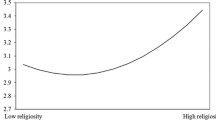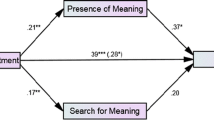Abstract
Recent understanding of subjective well-being suggests that it consists of global judgments of life satisfaction, hedonic experiences, and beliefs about facets of one’s life. Traditionally, life satisfaction judgments have been the outcome of interest in studies examining the relationship between religiosity and well-being. Two studies were conducted to look at the interactive effects of personal religious beliefs, namely God images, and environmental stimuli, particularly priming the thought of “God.” The first study examines hedonic experiences, which is one of the information sources when constructing a well-being judgment. A second study attempts to replicate the findings with life satisfaction ratings. Results of the first study showed that one’s image of God as a controlling or non-controlling entity moderated the affective response to being primed to think about God. In particular, those who had a high controlling image of God had a negative affective reaction to the God prime. Results of the second study replicated the pattern of results using life satisfaction ratings as the dependent variable.
Similar content being viewed by others
References
P. Benson B. Spilka (1973) ArticleTitle‘God image as a function of self-esteem and locus of control’ Journal for the Scientific Study of Religion 12 297–310
B.F. Brokaw K.J. Edwards (1994) ArticleTitle‘The relationship of God image to level of object relations development’ Journal of Psychology and Theology 22 352–371
J.R. Buri R.A. Mueller (1993) ArticleTitle‘Psychoanalytic theory and loving God concepts: Parent referencing versus self-referencing’ The Journal of Psychology 127 17–27
S.A. Roos ParticleDe S. Miedema J. Iedema (2001) ArticleTitle‘Attachment, working models of self and others, and God concept in kindergarten’ Journal for the Scientific Study of Religion 40 607–618
E. Diener (1984) ArticleTitle‘Subjective well-being’ Psychological Bulletin 95 542–575
E. Diener (1994) ArticleTitle‘Assessing subjective well-being: Progress and opportunities’ Social Indicators Research 31 103–157 Occurrence Handle10.1007/BF01207052
E. Diener R.A. Emmons R.J. Larsen S. Griffin (1985) ArticleTitle‘The Satisfaction With Life Scale’ Journal of Personality Assessment 49 71–75 Occurrence Handle10.1207/s15327752jpa4901_13
E. Diener E. Suh R.E. Lucas H.L. Smith (1999) ArticleTitle‘Subjective well-being: Three decades of progress’ Psychological Bulletin 125 276–302 Occurrence Handle10.1037/0033-2909.125.2.276
E. Diener M.E.P. Seligman (2002) ArticleTitle‘Very happy people’ Psychological Science 13 81–84 Occurrence Handle10.1111/1467-9280.00415
R.A. Emmons L.A. King (1989) ArticleTitle‘Personal striving differentiation and affective reactivity’ Journal of Personality and Social Psychology 56 478–484 Occurrence Handle10.1037/0022-3514.56.3.478
A.N. Fabricatore P.J. Handal L.M. Fenzel (2000) ArticleTitle‘Personal spirituality as a moderator of the relationship between stressors and subjective well-being’ Journal of Psychology and Theology 28 221–228
F. Fujita E. Diener E. Sandvik (1991) ArticleTitle‘Gender differences in negative affect and well-being: The case for emotional intensity’ Journal of Personality and Social Psychology 61 427–434 Occurrence Handle10.1037/0022-3514.61.3.427
T.L. Gall R.M.M. Renart Particlede B. Boonstra (2000) ArticleTitle‘Religious resources in long-term adjustment to breast cancer’ Journal of Psychosocial Oncology 18 21–37 Occurrence Handle10.1300/J077v18n02_02
G. Gallup D.M. Lindsay (1999) Surveying the Religious Landscape: Trends in U.S. Beliefs Morehouse Publishing Harrisburg, PA
C.H. Hackney G.S. Sanders (2003) ArticleTitle‘Religiosity and mental health: A meta-analysis of recent studies’ Journal for the Scientific Study of Religion 42 43–55 Occurrence Handle10.1111/1468-5906.t01-1-00160
J.F. Hammersla L.C. Andrews-Qualls L.G. Frease (1986) ArticleTitle‘God concepts and religious commitment among Christian university students’ Journal for the Scientific Study of Religion 25 424–435
T.R. Hettler L.H. Cohen (1998) ArticleTitle‘Intrinsic religiousness as a stress-moderator for adult Protestant churchgoers’ Journal of Community Psychology 26 597–609 Occurrence Handle10.1002/(SICI)1520-6629(199811)26:6<597::AID-JCOP6>3.0.CO;2-M
L.A. Kirkpatrick (1998) ArticleTitle‘God as a substitute attachment figure: A longitudinal study of adult attachment style and religious change in college students’ Personality and Social Psychology Bulletin 24 961–973
L.A. Kirkpatrick P.R. Shaver (1992) ArticleTitle‘An attachment-theoretical approach to romantic love and religious belief’ Personality and Social Psychology Bulletin 18 266–275
J. Maltby L. Day (2003) ArticleTitle‘Religious orientation,religious coping and appraisals of stress Assessing primary appraisal factors in the relationship between religiosity and psychological well-being’ Personality and Individual Differences 34 1209–1224 Occurrence Handle10.1016/S0191-8869(02)00110-1
D.G. Myers E. Diener (1995) ArticleTitle‘Who is happy?’ Psychological Science 6 10–19
K.I. Pargament (1997) The Psychology of Religion and Coping: Theory, Research, and Practice Guilford Press New York
K.I. Pargament D.S. Ensign K. Falgout H. Olsen B. Reilly K. Haitsma ParticleVan R. Warren (1990) ArticleTitle‘God help me: I. Religious coping efforts as predictors of the outcomes to significant negative life events’ American Journal of Community Psychology 18 793–824 Occurrence Handle10.1007/BF00938065
M.M. Poloma B.F. Pendleton (1988) ArticleTitle‘Religious domains and general well-being’ Social Indicators Research 22 255–276
W.C. Rowatt L.A. Kirkpatrick (2002) ArticleTitle‘Two dimensions of attachment to God and their relation to affect, religiosity, and personality constructs’ Journal for the Scientific Study of Religion 41 637–651
S. Sethi M.E. Seligman (1993) ArticleTitle‘Optimism and fundamentalism’ Psychological Science 4 256–259
R. Veenhoven (1991) ArticleTitle‘Is happiness relative?’ Social Indicators Research 24 1–34 Occurrence Handle10.1007/BF00292648
D. Watson L.A. Clark A. Tellegen (1988) ArticleTitle‘Development and validation of brief measures of positive and negative affect: The PANAS scales’ Journal of Personality and Social Psychology 54 1063–1070
F.K. Willits D.M. Crider (1988) ArticleTitle‘Religion and well-being: Mean and women in the middle years’ Review of Religious Research 29 281–294
R.A. Witter W.A. Stock M.A. Okun M.J. Haring (1985) ArticleTitle‘Religion and subjective well-being in adulthood: A quantitative synthesis’ Review of Religious Research 26 332–342
Author information
Authors and Affiliations
Corresponding author
Rights and permissions
About this article
Cite this article
Wiegand, K.E., Weiss, H.M. Affective Reactions to the Thought of “God”: Moderating Effects of Image of God. J Happiness Stud 7, 23–40 (2006). https://doi.org/10.1007/s10902-005-0930-6
Issue Date:
DOI: https://doi.org/10.1007/s10902-005-0930-6




